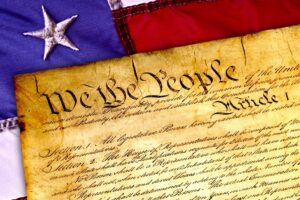What Are the Grounds for Presidential Impeachment?
Article 1, Section 4 provides that a sitting president “shall be removed from Office on Impeachment for, and Conviction of, Treason, Bribery, or other high Crimes and Misdemeanors.” A general rule employed by courts for centuries when interpreting a legislative enactment holds that if something is specifically mentioned along with other things in a list, the listed items are not simply duplicates. They must, by definition, mean different things. Those who drafted the law surely would not have wasted their, or our, time in repeating themselves, or so the principle holds. Following this logic, As Attorney Eric T. Kirk will tell you.
…..other high crimes and misdemeanors must then encompass additional conduct, beyond bribery and treason, that subject the President to impeachment.
But what is the additional conduct? We know what treason and bribery are. The Constitution defines treason as “levying War” against the United States, or in “giving aid and comfort” to her enemies. Bribery is defined in the US Code as the acceptance by a public official of anything of value, in exchange for being influenced in the performance of an official act, to violate their official duties, or to defraud the United States.

The clause recites that there are “other” offenses, perhaps similar in magnitude, that should be punished by impeachment, though what those other offenses might be has been the subject of centuries of debate. The phrase or other high crimes and misdemeanors is not defined, and substantially more nebulous. The authors of the annotations to the US Constitution, in analyzing some of the materials associated with the drafting and adopting of the provision, highlight divergent views. Some suggested that “high crimes and misdemeanors” was intended to mean serious conduct, but, not necessarily criminal conduct, that was connected with an act of misfeasance in office. There is a school of thought that the origin of the phrase other high crimes and misdemeanors comes from English common law, where it referred to crimes by a public official in office, effectively one against the crown, parliament or administration. Other proponents sought to limit impeachable offenses to serious, but also criminal, conduct.



